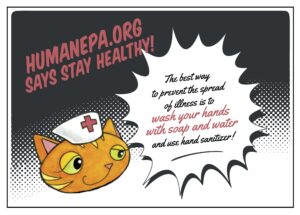Written by: Inga Fricke, Director of Community Initiatives, Humane Pennsylvania
Like most of you, I am trying to navigate our new reality, trying to stay vigilant but still maintain as much normalcy as possible. And like you, I’ll bet, I’m grateful for the reassuring presence of my pets as my interactions with other humans become fewer and fewer thanks to social distancing. Watching the news this morning, I happened to hear an interview with Rabbi Jeffrey Myer from the Tree of Life synagogue in Pittsburgh (the site of a horrific mass shooting in October of 2018) and what he said resonated with me – he said we shouldn’t actually be practicing social distancing, we should be practicing PHYSICAL distancing with social CONNECTION. To me, this sums up the best of what I’m seeing in our communities right now, and it is especially relevant to us as pet lovers.
I’m seeing messages all over social media encouraging people to foster pets while they’re stuck at home, and it’s working! Shelters are hosting drive-through foster events, scheduling adoptions by appointment, and coming up with other creative ways to help clear out their kennels and cages. Wisconsin Humane Society, for example, announced on Friday that 159 animals were adopted and another 160 went into foster care just 5 days after they put out the call for help – that’s amazing! It’s a wonderful example of what can happen when animal lovers come together through social connection to help pets in need. If you’ve ever been curious about fostering before, now’s the time to try it!
Not all pets have been lucky enough to find temporary or permanent placement, of course, so shelter workers, just like doctors, nurses, truck drivers and grocery store clerks, aren’t getting time off while the world is shutting down around them. They perform a critical lifesaving function each and every day, and they serve the animals in their care regardless of what type of disaster is happening around them. If you are able, consider dropping off some snacks or cookies (or toilet paper!) at their front door as a thank you, or maybe give them a shout-out on social media for staying in the trenches so others can stay safely at home – they deserve it!
Pet food pantries, like Humane Pennsylvania’s Spike’s Pet Pantry are continuing to serve pet owners in need. Our methods of operation have changed to keep everyone at a safe distance, to be sure. At Spike’s, we used to welcome people into the lobby of our Community Resource Center to pick up their food, now we’re talking to them through our Ring doorbell and leaving their food outside the door. Other groups, like Baltimore’s Charm City Companions, are packing pet food into care packages and leaving them right on clients’ doorsteps. But while the physical distance between us and those we help has changed, our social commitment to serving their needs remains intact.
Each and every one of us can do good for pets while we’re stuck indoors. Newly minted home-school parents can start your own “Rescue Readers” program by having your children read a favorite story to their cat or dog (many shelters, like Humane League of Lancaster, have had to suspend their formal reading programs for shelter animals temporarily, but will be eager to restart them when they can). Or perhaps add some shelter-friendly crafts and projects to your child’s routine. Shelter pets always need a stash of Kong toys stuffed with frozen peanut butter and biscuits inside, you can store them in your freezer and eventually drop them off at the shelter. Empty paper towel and toilet paper rolls (you know you’ve got ‘em!) can be converted into wonderful treat dispensers just by putting kibble or small treats inside, cutting a small hole in the middle, and squishing the ends together. You might also crochet soft, warm blankets for shelter pets to warm up on – or if you’re like me, and aren’t especially crafty, there are easy no-sew blanket options with instructions available online. Just Google “crafts to help shelter pets” and you’ll find pages full of fun ideas (like this one from GreaterGood.org).
You can also look for ways to connect directly with other pet lovers in your community who might need some extra support right now. I’m sure you’ve seen the heartwarming stories of people offering to make food deliveries, pick up medicines, or provide other necessary services to neighbors in need. To be sure, people self-islolating because they are in a high risk category are likely to be in need of food for their pets, which can be dropped off right at their front door, or might be grateful for a helping hand to take their dog to the park for them to get some exercise. And just knowing they have a neighbor they can call on to take more extensive care of their pets should they become ill will be a huge relief (all indications right now are that dogs and cats are not sources of virus transmission, but of course everyone should wash their hands thoroughly after handling a pet that may have been exposed and ideally wash dogs to eliminate any chance of virus lingering on the fur). Using Nexdoor, Facebook neighborhood groups and other social media outlets you can connect with pet owners around you and look for opportunities to provide social support while maintaining appropriate physical distance.
Now more than ever, we have to come together as a community of pet lovers – even as we are heeding warnings to stay physically apart. Physical distancing with social connection – that is precisely what we all need to stay strong and get through this together.


